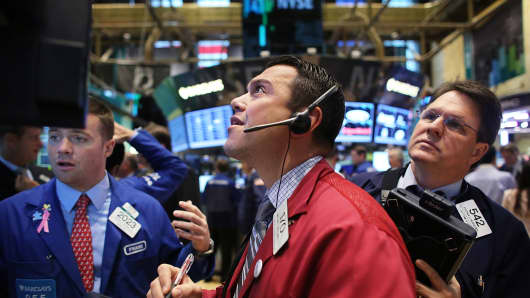It's not complicated: the market is trying to figure out the right level for interest rates now that it appears there will be less central bank support in the future.
This choppiness is causing a real problem for active investors--they keep getting their heads--and other body parts--chopped off in the whipsaw action.
"I keep trying to short the market, and they keep jamming it up my a--," one disgusted trader said.
Don't kid yourself: there is far more damage to the market than the Dow Industrial Average indicates. I see about 2,500 stocks down, 500 up--a 5 to 1 declining/advancing ratio.
The problem is that the global economic recovery is very fragile, and it cannot withstand a sudden dramatic move up in interest rates. Even the relatively modest moves up in interest rates in the past few weeks have caused a flutter in global markets.
More and more, Bernanke's May 22nd testimony in front of Congress, where he discussed the possibility the Fed may taper bond purchases some time in the next few meetings--and the release of the FOMC minutes that day--has become at least a short-term "inflection point" for the market.
Specifically, an inflection point for interest rates: yields on the 10-Year Treasury have risen from roughly 1.9 percent to 2.2 percent in those three weeks. That day, the S&P 500 hit a historic high, and while it is off those highs bond funds have suffered considerable more damage since May 22:
- S&P 500: -2.5%
- High-Yield Bonds: -4.4%
- Long-Term Treasuries: -4.3%
- Corporate Bonds: -3.9%
These higher interest rates are a particular problem for emerging markets, since they crimp investment and cause some "flight to quality."
I know the world is focused on the turmoil in Turkey, but other emerging markets have also dropped as interest rates have risen.
Emerging markets since May 22...
- Turkey: -21.4%
- Philippines: -17.4%
- Thailand: -17.1%
- India: -11.2%
Japan is still influencing the U.S. After months of weakening, the Yen has strengthened against the U.S. Dollar since May 22, and it did so again midday, causing our markets to take another leg down.
Since May 22, the Yen has strengthened about eight percent against the U.S. Dollar.
That doesn't fully describe what is going on: it's the leverage that matters. The Yen trade has HUGE leverage in it, so when this trade unwinds--as it is doing to an extent now--it affects a lot of other areas of the market as traders cover positions.
At least there was a likely headline for today's rally in the Yen: traders cited the "Nikkei News" reporting that Japanese authorities plan to adopt a bail-in policy for failing banks, to force losses on investors if necessary.









